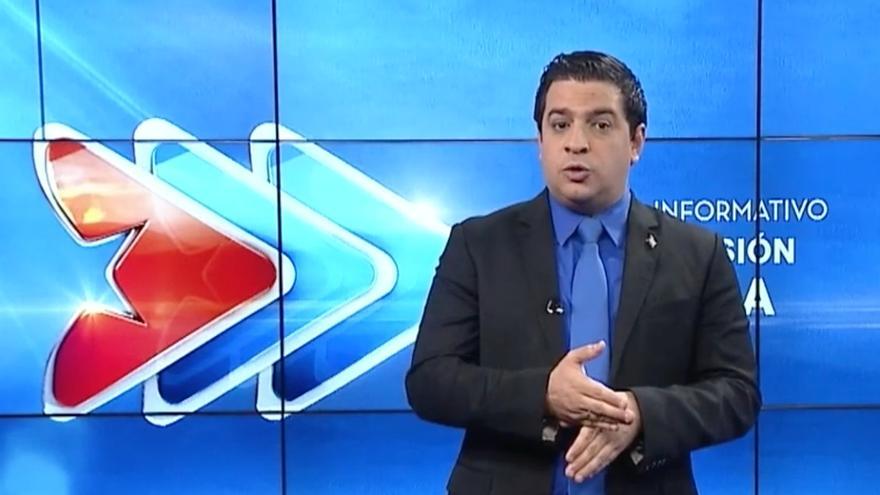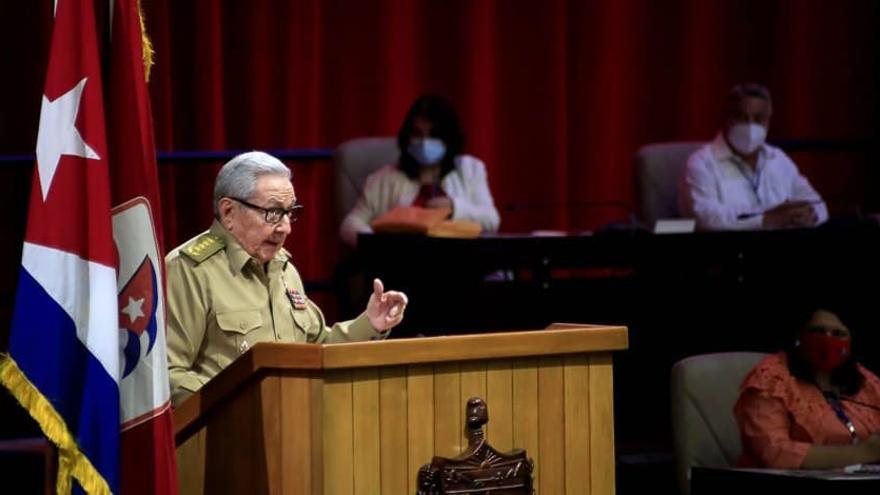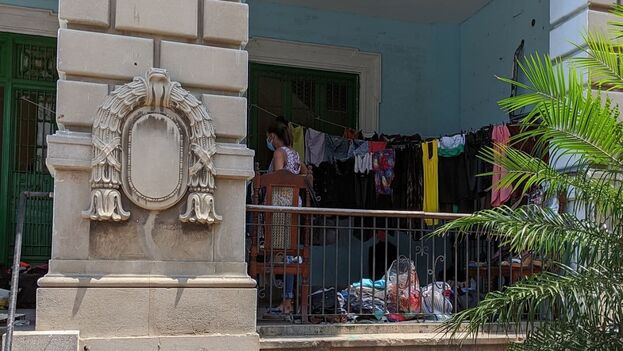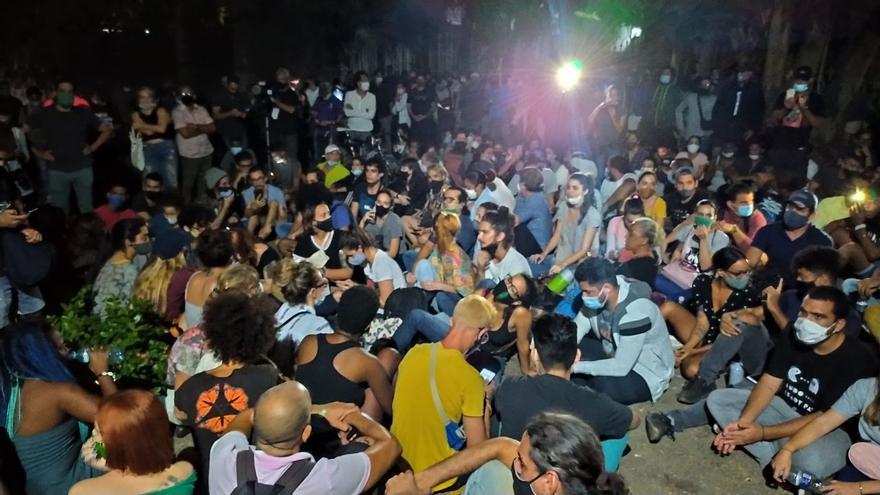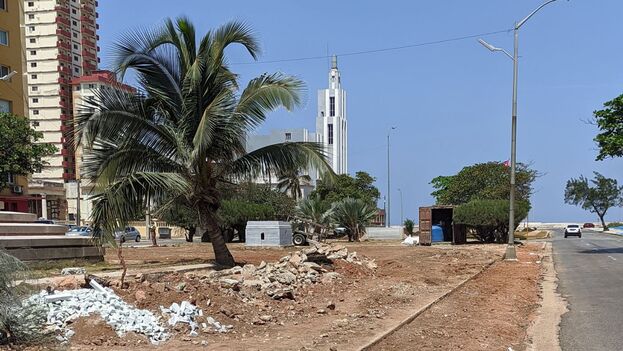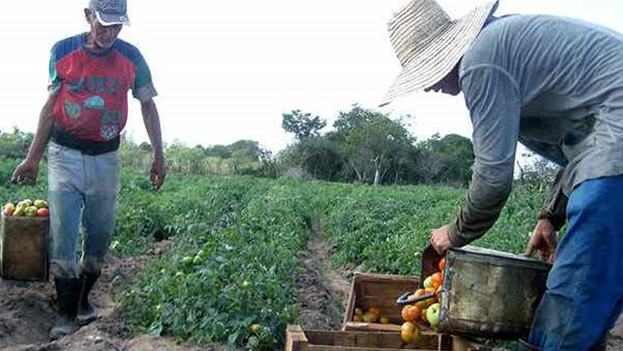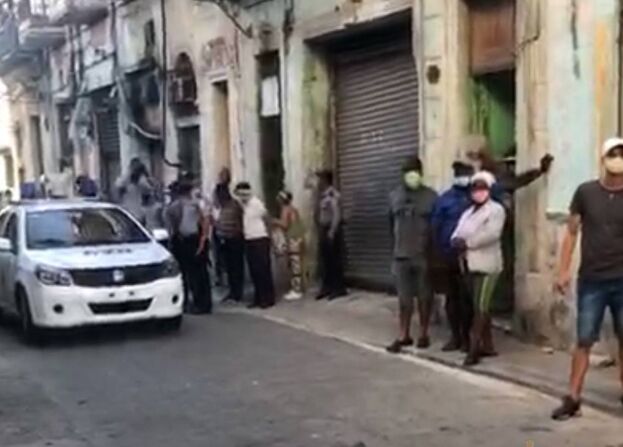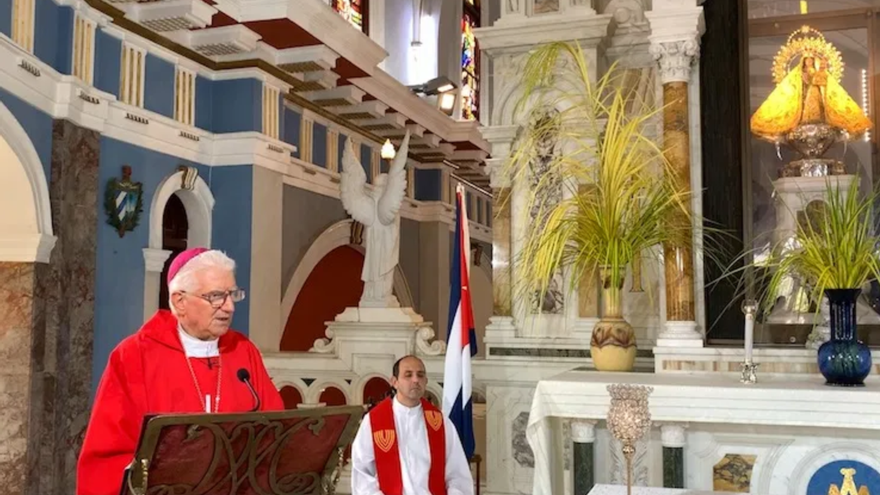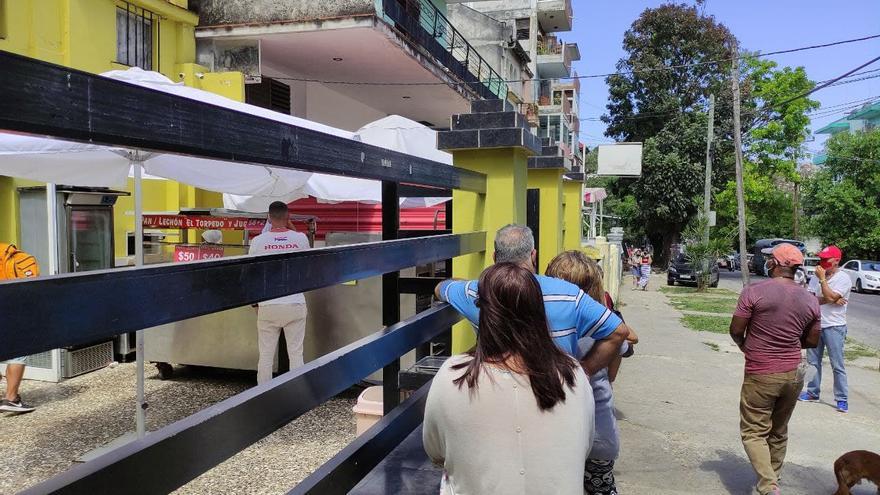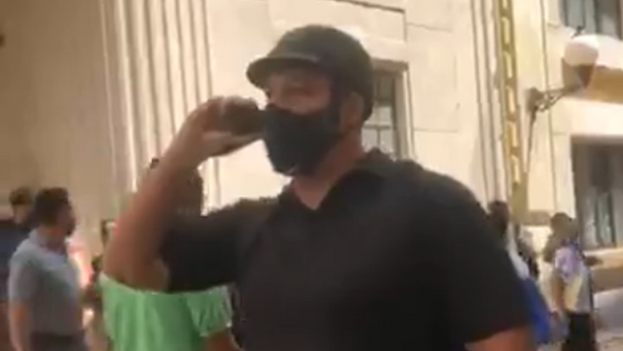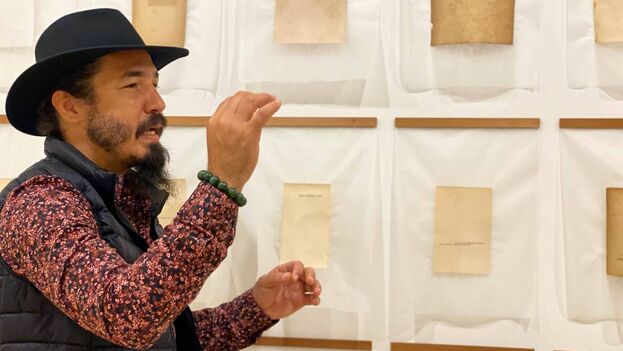Novo’s work, which has been exhibited in Mexico, the United States, Italy, Germany and Brazil, as well as in Cuba, weaves the story together with stitches of poetry, and embroiders, in the poetic, signs that come from the political. His installations, photos and his projects are a constant reading and rereading of the national memory.
Currently, the artist is exhibiting the second part of the show “What Is, What Has Been” at the gallery El Apartamento. It is conceived in two parts. The first, “Neither Marble nor Sighs, The Nation’s Fundamentals”, was exhibited in December. During these days, the artist prepared the second installment: “Cartography of Freedom, Prison, Economy and Liberty”.
A few months later I voluntarily decided to drop out of school because I felt like I wasn’t learning much.
14ymedio: Then, one day you decided not to return.
Novo: I had been in Mexico for a whole year. I visited the great murals of David Alfaro Siqueiros while I was there, Diego Rivera, José Clemente Orozco, I had seen the colors, the monumentality of those stimulating works, I had been in their presence. Well, one day I came to a Latin American Art class at ISA and they were teaching Mexican muralism. They began to show these works through faded slides, projected small on the wall. I realized that this had nothing to do with reality and I said to myself: “If this is the case with this subject, it must be more or less similar with everything. Maybe when they teach me some philosophy it will be at this same level”. I made a horizontal parallel line of all the degree subjects and I understood that they were teaching us in a distorted way. I said to myself: ‘I have to get out of here’.
14ymedio: Do you think that Cuban art academies try to impose a pattern of what it is to be an artist?
Novo: There is a part of the school that is very repetitive, you imitate great teachers and nature a lot. In that process there really is not much creativity. I began to create personally around the third year of San Alejandro thanks to a teacher named Rolando Vázquez who gave us more conceptual exercises. In attempting to solve these exercises I began to have ideas of my own. This is how I started in the world of sculpture, to work with space and that type of dynamics, something that was later strengthened at the ISA with research and the theoretical study of creative processes.
There is always a guide, because in the end everything has to do with success. Everyone does something to get to places and people create formulas. In my case, I was quite radical, intuitive. I was a bad student, at that time I was already living in Párraga and I was missing school, I was absent, super late, and it was very difficult for me to get into that rigid space where certain things had to be done. Many times, I would start to go to school and would stray with members of the neighborhood, and I would play rumba as well as talk garbage. That space was also stimulating and creative for me, I always went to drink more from the sources of life itself than from art.
14ymedio: At that time you had already gone through the Tania Bruguera’s Cátedra de Arte de Conducta (Behavior Art School). What did that space mean at that time?
Novo: I was there for two years and it was parallel to my first courses at ISA. The Cátedra was a time of great expansion. Now I see it and compare it with the moment when I opened up to social networks for the first time, when I became a Facebook member, for example, which was a huge expansion, suddenly finding many people who I thought were lost. People who are in other countries are suddenly by your side. Your social body expands because you post a photo, which could be in your wallet or at home, but if you post it on social networks it expands, and the Cátedra de Arte de Conducta was that for me. It was like fragmenting the mind into thousands of pieces, like dynamite, with people coming from all over the world to teach us. That program is most likely one of the best that has taken place in Cuba at the level of artistic education. The environment was completely different from the school, although it was born as an academic project within the ISA.
14ymedio: Throughout your career you have encountered censorship several times.
Novo: I think the moment where I experienced censorship firsthand, raw and frontally, was at the 50th Anniversary Collection exhibition at the Visual Arts Development Center in 2009. Sachie Hernández ran the place at that time. The exhibition was a series of T-shirts, posters, collages with clippings from the Granma newspaper, a commemorative baseball, a collection of stamps, a book; a kind of ideological advertising campaign of about 50 years of the Cuban Revolution.
The wording on the T-shirts and the iconography of the posters had a lot to do with the editorial aesthetics of Granma at that time. The signs I generated with the collages were really strong, politically strident, very confrontational. I remember that on inauguration day, a demonstration for non-violence was held, that Yoani Sánchez was not allowed to get there, and music acts were invented to extinguish any type of demonstration. That day, the Development Center got hot, because people from the march began to arrive and communicated what was happening. Amaury Pacheco and Adrián Monzón were among other artists who were already, in some way, connected with the dissent. The days were warm, the atmosphere was tense.
They brought an order that said that Los Aldeanos could not sing at State cultural institutions, and I could not do anything
14ymedio: But at what point did the censorship arrive?
Novo: I wanted everything to be a multimedia show, we did visual projections and we had invited several rappers to sing, Los Aldeanos, Silvito el Libre, Maykel Xtremo and Danay Suárez. Everyone but Los Aldeanos was able to participate. It was an explicit censure. I remember several meetings with Sachie and the National Council of Plastic Arts. They brought an order saying that Los Aldeanos could not sing in State cultural institutions and there was nothing I could do.
I tried so that the part that was being censored did not sacrifice the whole of the entire exhibition, although it had already been mutilated. Some posters and collages had to be taken down from the wall, but even so, there was still a majority that wanted them to be displayed. Later, I learned that the pressure on the director of the Center had been enormous and that the State Security had summoned her several times, in addition to some anonymous ones who sent tor her questioning the exhibition. Within a few months, she was officially separated from her position. That was the first chapter of censorship that I experienced.
14ymedio: You were among the artists who protested against Decree 349 and among those who were in front of the Ministry of Culture on November 27th. What leads you to get involved in these causes?
Novo: I have always looked for trouble, perhaps because I raise my voice when I have to because of my sense of justice. In the historic moment that we are living, to ignore what happens is to be part of the problem and I want to be part of the solution. I want things to change because they don’t have to be this way, we live in a country where everything has to be done in a specific way and it doesn’t have to be that way. I think the wrong side is not raising your voice. I feel like I’m in the right place doing what I have to do.
14ymedio: Do you think that this has resulted in a deterioration of your relationship with the country’s cultural institutions?
Novo: My relationship with the Ministry of Culture and with the authorities in power has changed radically, the thing is that I am not interested. I continue to greet all the officials in the same way. I feel that my position is not against them, but against the institution they represent. For some time now, I have not been interested in using Cuban institutions for anything, although they are there for a reason and they could accomplish a completely different job, I think they have closed the doors to me. However, I feel that I can be an institution, and that all of us, together, my group of friends, for example, generate spaces as legitimate as the institutions themselves.
For some time now, I have not been interested in using Cuban institutions for anything, although they are there for a reason and they could accomplish a completely different job, I think they have closed the doors to me
14ymedio: Since launching the song Patria y Vida [Homeland and Life] a wave of much official controversy has been generated. How do you see the concept of “homeland”?
Novo: The homeland is full of death, because we have built that concept based on sacrifice and heroism, but homeland can also be something else completely different. The concept that has been followed since 1959 has a dark meaning of sacrifice. That is what the Cuban State asks of the people, to sacrifice themselves, that one has to die for the country, but in reality, if you die, the country ends for you, therefore, it is better to live for it.
There is also a very great vice of following things literally and it has a lot to do with the lyrics of the Cuban National Anthem, when it says that “to die for the homeland is to live”. Things must be seen at the time and according to the historical context that was taking place. The Bayamo anthem is from 1867, Cuba was under an iron colonial system and it must be understood that, at that time, Cubans who fought for independence were able to think that way and were willing to give their lives for that independence. They interpreted the motherland as the need to die for her.
Now it doesn’t have to be this way, we are in the 21st century and we have the ability to see things differently. The problem that has been generated with Patria y Vida is because they cannot accept the content and the truths in the song, palpable truths. They do not want a break in their rhetoric brought by people who do not currently live in Cuba, such as some of those musicians who created the musical theme. The homeland space has been circumscribed to the national territory, so if you are outside the Island, you are no longer recognized as part of this homeland, however, this is not so. The homeland is a transnational entity that surpasses the country’s borders, it is within us all the time. The controversy that has been generated around such a beautiful song that promotes something so human is meaningless.
The homeland is a transnational entity that surpasses the country’s borders, it is within us all the time
14ymedio: Many artists of your generation have gone to live abroad, did you choose to stay in Cuba to fight for freedom?
Novo: The Cuban nation owes a debt to peace and freedom. From our small projection space and with our own tools we are fighting for freedom. The mambises had machetes and we have telephones, computers, and paintbrushes. Each one of us, in the circuit of friends we are connected to, is thinking of a prosperous Cuba with freedoms, democratic and open. That Cuba we dream of, the one that should be, and that I believe that in some way we are achieving. I don’t like to think about it all the time because it is like doing a historiography of the present. Sometimes one solves more by washing a plate than by thinking that the plate can be washed in one way or another. The important thing is to get things done, to be here.
I have never seriously considered leaving Cuba, although the reality is getting more difficult every day. There is a great lack of everything, and an overwhelming poverty of spirit and material. I have traveled to many places and I know that you can live differently, but I have always thought that this is where I have to do things and you reach a point where you say: ‘If I am here it is because I have decided to be here, and I am fulfilling a function’. I hope I can fulfill a function.
Translated by Norma Whiting
____________
COLLABORATE WITH OUR WORK: The 14ymedio team is committed to practicing serious journalism that reflects Cuba’s reality in all its depth. Thank you for joining us on this long journey. We invite you to continue supporting us by becoming a member of 14ymedio now. Together we can continue transforming journalism in Cuba.
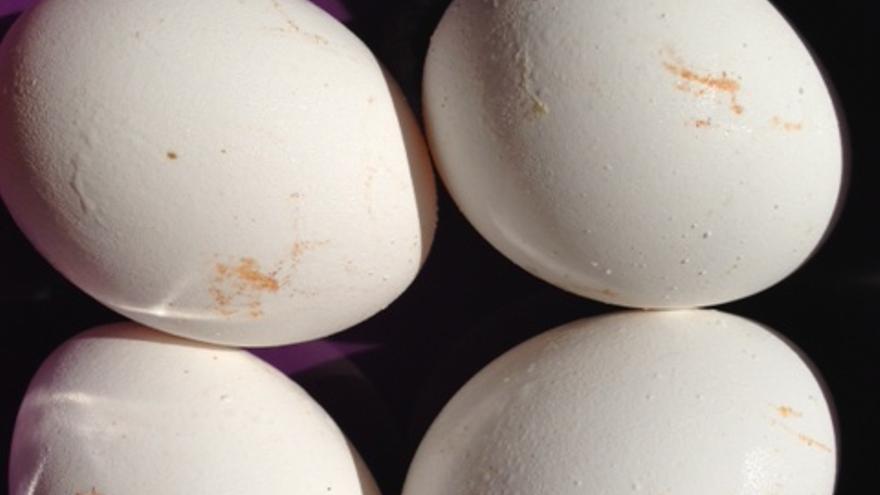
![]() 14ymedio, Havana, 16 April 2021 — The imminence of the Eighth Congress of the Cuban Communist Party (PCC), which begins its work this Friday, has had a beneficial effect on Cuban chickens and a rebound for residents of the capital. This was announced on Thursday, with great satisfaction, by the Ministry of Internal Commerce which reported a substantial improvement compared to the month of March: in April there will be four more eggs available under “controlled” sales for people living in Havana and one more egg per person in the rest of the provinces.
14ymedio, Havana, 16 April 2021 — The imminence of the Eighth Congress of the Cuban Communist Party (PCC), which begins its work this Friday, has had a beneficial effect on Cuban chickens and a rebound for residents of the capital. This was announced on Thursday, with great satisfaction, by the Ministry of Internal Commerce which reported a substantial improvement compared to the month of March: in April there will be four more eggs available under “controlled” sales for people living in Havana and one more egg per person in the rest of the provinces.
